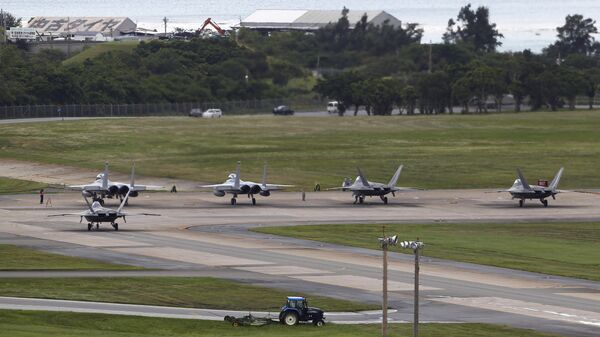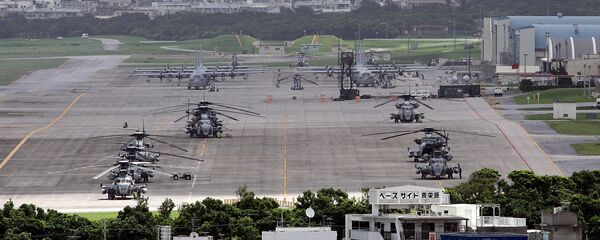"We asked the United States to cancel the drills and cancel notifications for aircraft. At the moment we have not got a US answer,” Inada said, as quoted by the NHK broadcaster.
Tomomi Inada also said that the Americans hadn’t given a seven-day prior notification of the exercise, which is part of the defense agreement currently existing between the two countries.
On May 15, 2015 the Okinawans celebrated 45 years since Japan regained control of their island.
The small island, which takes up a mere 0.6 percent of Japan’s landmass, hosts 74 percent of US military installations in the country and over 50 percent of US troops deployed in Japan.
US military bases take up a hefty 18 percent of the island’s territory, including farmlands.
Rapists, murderers, burglars
The presence of US troops has been repeatedly criticized by Okinawa’s residents due to a high number crimes committed by US military personnel, as well as because of US aircraft crashes in the vicinity of their airbases located on the island.
The rape of a 12-year-old local schoolgirl by three US Marines in 1995 set off a massive wave of nationwide protests with almost 90,000 people rallying in the streets of Japanese cities demanding justice for the culprits and changing the legal status of US military stationed in the country.
The Pentagon was forced to punish the three Marines and scale down the number of US troops on the island.
Meanwhile, the crime rate on Okinawa, resulting from the presence of thousands of US troops, remains higher than anywhere else in the country.
According to local police reports, between 1972 and 2015, US military personnel stationed on the island committed almost 6,000 crimes, including homicides, rapes, burglaries and arsons.
A life turned into a nightmare
Okinawans are also concerned about noise, pollution, forest fires and the threat of crashes and other accidents as US military aircraft fly overhead.
In February 2017, a local court awarded $265 million to people living around Kadena airbase for noise beyond permissible levels.
The court also admonished the federal authorities for ignoring the situation and not taking concrete steps to curb the noise. However, it rejected demands to limit US military flight operations on the island.
Aircraft noise has been a major issue on Okinawa since the end of World War II when the island fell under US administration.
In the past year alone, there have been multimillion dollar settlements that must be paid by the government of Japan, including one in November that saw 3,417 residents around Marine Corps Air Station Futenma receive $22.6 million, military.com wrote.
Many in Japan are also worried about the security risks posed by the heavy US military presence in the country.
In a recent statement, the Japanese Foreign Ministry warned that the US military bases stationed in the country could become easy targets for North Korean ballistic missiles. This means that their very presence on Japanese soil is becoming a serious security risk.
US security umbrella
“On the one hand, the Japanese government is hamstrung by the 1960 security cooperation agreement with the US and, on the other, by the dangerous proximity to North Korea and China, which necessitates to need for US military presence in the country and the security guarantees given it by Washington,” Anatoly Koshkin, a professor at the Institute of the Far East in Moscow, told Sputnik.
“Still, the concentration of US aircraft carrier groups off the Korean peninsula is dangerously fraught with unpredictable consequences,” he added.
Meanwhile, the United States is sending a third carrier strike force to the Western Pacific.
The Nimitz group will join the strike groups led by the aircraft carriers Carl Vinson and Ronald Reagan. The current US naval buildup near the Korean peninsula is meant to serve as a warning to Pyongyang.
“The Trump administration deployed the strike force to put pressure on Pyongyang to refrain from more nuclear and missile tests amid mounting concern that it will soon acquire the capability to launch intercontinental ballistic missiles,” the Japanese newspaper Asahi Shimbun reported.
Never miss a story again — sign up to our Telegram channel and we'll keep you up to speed!





